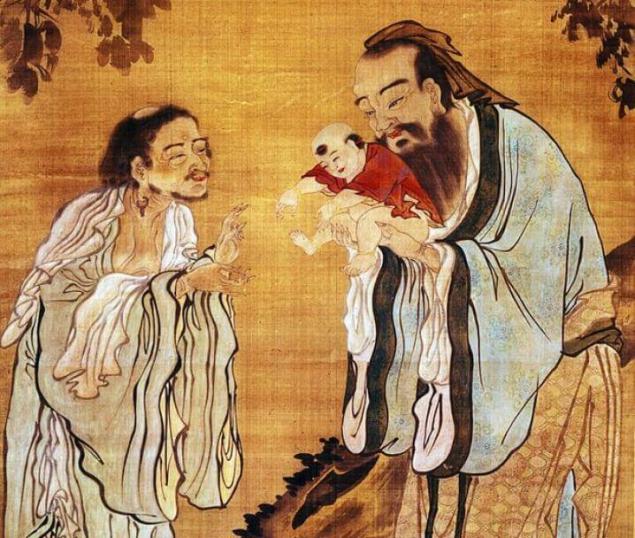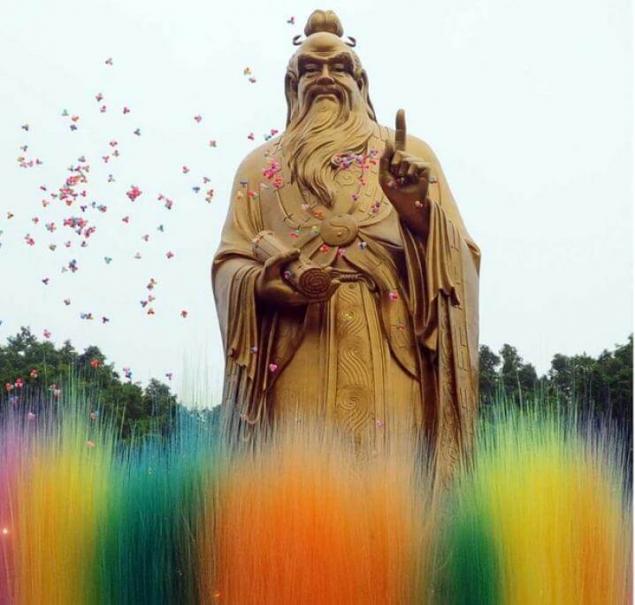896
Cease to look for yourself! As Chinese philosophers teach you the good life
The history of Chinese philosophy in our time has become the most popular course at Harvard. What is she so entertaining? Let's look at the most interesting tips on how to get better, according to Confucius and other great thinkers and philosophers of China.

People are often surprised to learn that Confucius, Mencius, Lao Tzu and other classic Chinese philosophers were not hard traditionalists, who taught that our highest good comes from the constraints of social roles. Nor were they and serene sages preach harmonious coexistence with the natural world. Rather, they were treated to a bright and radical thinkers who undermined the conventions of their society. They sought to make the world better, expanding the boundaries of human capabilities.
The middle of the first millennium BC was as stormy as today regarding disputes about how to live, how to preserve morality and how to build a better society. In contrast to Western philosophers, which we know better the Chinese thinkers wondered not as major issues. Their philosophy can be called highly pragmatic, based on issues that seem insignificant, for example: "How is your daily life?»
These thinkers emphasized that great changes happen only when we begin with the mundane and feasible. Their teachings show that many of our most basic assumptions about how we should live, in fact, misleading.
So, what ideas we cherish, and what alternatives would be offered in place of the Chinese philosophers?
Stop looking for himself
Our thinkers skeptical about the existence of the true "I". Especially the fact that you may find yourself looking in.
There is such a popular postulate: it is important to look at yourself, to understand and grasp its true essence. Our thinkers would react with skepticism to the theory of the existence of the true "I».
They understood that we are multi-faceted and evolving towards the outside world, rather than inward. The human personality is formed through interaction with other people, through the reactions to things and events, through the occupation. You do not behave the same way with his mother, a colleague, a dentist and a close friend.
Each one of us - a complex creation, which constantly faces other complex creatures. Each meeting outlines the various parties. We are composed of behavioral and emotional habits that have developed over time. And it means that we have incorporated numerous possibilities of what we can become.
Being inauthentic
We have not only what we think of ourselves.
As soon discover its essence, we have to accept yourself and be true to yourself. But the great Chinese thinker Confucius, who was born in the sixth century BC, was thinking otherwise. He would say that the problem with the authenticity that is not liberation, we believe. What do you think, who is the "true self", which you find yourself? It is your image at a time. If you remain faithful to him, let this image be your guide, he will keep, and limit your growth, which will come when you recognize that is constantly changing.
We succeed when acknowledge its complexity and learn to work with it through self-improvement. The growth starts, for example, when it comes to the understanding that you can not bully because tend to think of myself as a person quick-tempered, or shy because consider yourself an introvert. Most labels - is a model of behavior that we have formed and indestructible. We are not just what we think of ourselves. We can always become a better version of yourself.
Pretend (performed rituals)
When you smile, if not angry, or bites his tongue to not lash out, you pretend - behave mature
. The opposite side of our veneration of authenticity - a ritualistic behaviors that are referred to as "a sham." Is not it better to let speak "really I»?
But Confucius teaches that certain rituals - when we behave "as if" - help a person to evolve as breaking patterns of behavior, in which he landed. When you smile, you do not seem to be angry, or bites his tongue to not lash out, you pretend. This "as if" create a tiny break from reality, why they are so valuable. We act "as if" we are different, and our senses become more mature. In doing so, we become someone more kind and generous, rather than to express their true, but destructive feelings. We do it again and again, such actions become rituals that allow the behavior to take precedence over the feelings, and not vice versa. Since we change over time, become better.
Try to see the impermanence of the world
Any detours - casual conversations, impressions, chat - nourish the life
. Often considering itself as a stable person, person sees the world and permanent. Of course, we realize that life can change, but at the same time tend to assume that the whole world is predictable and you need to determine how we fit into it. If we consider ourselves strong in math, we continue to follow this academic path; if we consider ourselves to be unpredictable, you are looking for a life partner who will join our adventure.
Mencius, the Confucian tradition of representative, who lived at the end of the 4th century BC, saw the world fragmented and unstable. It would be advised to work with the changes in a roundabout way - use random conversations, impressions and talks to extend life. Approach Mencius means not to plan for life, and adjust the trajectory of the move.
Stop taking decisions
When you are considering a big change, it is easier to decide if you first experience the new experience.
You know what's wrong with life plan? When you plan your life, you make decisions for the future of the person relying on the personality, where you are today.
Taking important decisions, Mencius would advise to approach them through small and manageable steps. When you are thinking about a career change, to establish themselves in the decision or reject it will be easier if you first get a new experience on a small scale. Pay attention to your reactions on received impressions, that it will lead you in a new direction.
Be weak
Notice in the world instead of the interconnectedness of separation and different, then you can be in harmony with others.
Another common hypothesis: the strongest wins. We are told that you need to be strong and confident in what we want. But Lao Tzu in his treatise Tao Te Ching in favor because of the weakness of the apparent power. Often people think that this means the need to harmonize with nature. Some students, for the first time confronted with the teachings of Lao Tzu, go for walks in the woods to blend with the grandeur of the natural world. But passivity is not quite what he meant. Philosopher said that we should notice how everything in the world is interconnected and not separated and different. This understanding helps to blend in with the other.
Attunement allows for all sorts of influences. Not using open force, you can see how skillfully to change the situation, so that people will not notice in your dominant.

Statue of Lao Tzu, founder of Taoism, in the urban district of Luoyang, China.
Do not flirt to their strengths
Live my life as a series of breakthroughs, because it changes you over time.
We call from a young age to discover and hone their skills and talents. If you are athletic, you are entering into a football team; if you constantly dig into the books, studying the literature. Becoming older person develops these natural tendencies, as long as they do not become part of his personality. But if you get carried away in this way of thinking, you can stop doing everything else.
Our philosophers would encourage you not to focus on what you think you are, and to break prejudices. If you think you are awkward, go dancing. If you are not good at languages, sign up for French lessons. The goal is not to become a new field better than anyone, and to live life as a series of breakthroughs, because it is something that changes us over time.
Discard awareness
Principles of awareness in the broadest sense opposite to its true purpose.
Lately we hear a lot about the importance of awareness. It should help a person in attaining peace and tranquility with the rapid pace of life. She was even portrayed as a tool to enhance productivity and efficiency in business schools, corporations, and the armed forces.
It is widely accepted principles of awareness - including look at yourself and accept the detected with impartiality and non-judgment - is the opposite of what was supposed to be awareness. Buddhism, after all, adhere to the doctrine of non-existence of the individual "I". Confucian self-cultivation is different. It is about the interaction with the world and cultivate themselves through every encounter and interaction. It professes an active rather than a passive way of self-education, to become the best version of yourself.
Rethink tradition and modernity
The modern attitude to everything suggests that you are freed from the oppressive traditional world and live their lives, making the choice themselves. But if you define the traditional world as one in which people passively accept everything as it is and try to fit into a stable, pre-established order, it means you are a traditionalist. The knowledge that we hold and believe the true limit our possibilities.

People are often surprised to learn that Confucius, Mencius, Lao Tzu and other classic Chinese philosophers were not hard traditionalists, who taught that our highest good comes from the constraints of social roles. Nor were they and serene sages preach harmonious coexistence with the natural world. Rather, they were treated to a bright and radical thinkers who undermined the conventions of their society. They sought to make the world better, expanding the boundaries of human capabilities.
The middle of the first millennium BC was as stormy as today regarding disputes about how to live, how to preserve morality and how to build a better society. In contrast to Western philosophers, which we know better the Chinese thinkers wondered not as major issues. Their philosophy can be called highly pragmatic, based on issues that seem insignificant, for example: "How is your daily life?»
These thinkers emphasized that great changes happen only when we begin with the mundane and feasible. Their teachings show that many of our most basic assumptions about how we should live, in fact, misleading.
So, what ideas we cherish, and what alternatives would be offered in place of the Chinese philosophers?
Stop looking for himself
Our thinkers skeptical about the existence of the true "I". Especially the fact that you may find yourself looking in.
There is such a popular postulate: it is important to look at yourself, to understand and grasp its true essence. Our thinkers would react with skepticism to the theory of the existence of the true "I».
They understood that we are multi-faceted and evolving towards the outside world, rather than inward. The human personality is formed through interaction with other people, through the reactions to things and events, through the occupation. You do not behave the same way with his mother, a colleague, a dentist and a close friend.
Each one of us - a complex creation, which constantly faces other complex creatures. Each meeting outlines the various parties. We are composed of behavioral and emotional habits that have developed over time. And it means that we have incorporated numerous possibilities of what we can become.
Being inauthentic
We have not only what we think of ourselves.
As soon discover its essence, we have to accept yourself and be true to yourself. But the great Chinese thinker Confucius, who was born in the sixth century BC, was thinking otherwise. He would say that the problem with the authenticity that is not liberation, we believe. What do you think, who is the "true self", which you find yourself? It is your image at a time. If you remain faithful to him, let this image be your guide, he will keep, and limit your growth, which will come when you recognize that is constantly changing.
We succeed when acknowledge its complexity and learn to work with it through self-improvement. The growth starts, for example, when it comes to the understanding that you can not bully because tend to think of myself as a person quick-tempered, or shy because consider yourself an introvert. Most labels - is a model of behavior that we have formed and indestructible. We are not just what we think of ourselves. We can always become a better version of yourself.
Pretend (performed rituals)
When you smile, if not angry, or bites his tongue to not lash out, you pretend - behave mature
. The opposite side of our veneration of authenticity - a ritualistic behaviors that are referred to as "a sham." Is not it better to let speak "really I»?
But Confucius teaches that certain rituals - when we behave "as if" - help a person to evolve as breaking patterns of behavior, in which he landed. When you smile, you do not seem to be angry, or bites his tongue to not lash out, you pretend. This "as if" create a tiny break from reality, why they are so valuable. We act "as if" we are different, and our senses become more mature. In doing so, we become someone more kind and generous, rather than to express their true, but destructive feelings. We do it again and again, such actions become rituals that allow the behavior to take precedence over the feelings, and not vice versa. Since we change over time, become better.
Try to see the impermanence of the world
Any detours - casual conversations, impressions, chat - nourish the life
. Often considering itself as a stable person, person sees the world and permanent. Of course, we realize that life can change, but at the same time tend to assume that the whole world is predictable and you need to determine how we fit into it. If we consider ourselves strong in math, we continue to follow this academic path; if we consider ourselves to be unpredictable, you are looking for a life partner who will join our adventure.
Mencius, the Confucian tradition of representative, who lived at the end of the 4th century BC, saw the world fragmented and unstable. It would be advised to work with the changes in a roundabout way - use random conversations, impressions and talks to extend life. Approach Mencius means not to plan for life, and adjust the trajectory of the move.
Stop taking decisions
When you are considering a big change, it is easier to decide if you first experience the new experience.
You know what's wrong with life plan? When you plan your life, you make decisions for the future of the person relying on the personality, where you are today.
Taking important decisions, Mencius would advise to approach them through small and manageable steps. When you are thinking about a career change, to establish themselves in the decision or reject it will be easier if you first get a new experience on a small scale. Pay attention to your reactions on received impressions, that it will lead you in a new direction.
Be weak
Notice in the world instead of the interconnectedness of separation and different, then you can be in harmony with others.
Another common hypothesis: the strongest wins. We are told that you need to be strong and confident in what we want. But Lao Tzu in his treatise Tao Te Ching in favor because of the weakness of the apparent power. Often people think that this means the need to harmonize with nature. Some students, for the first time confronted with the teachings of Lao Tzu, go for walks in the woods to blend with the grandeur of the natural world. But passivity is not quite what he meant. Philosopher said that we should notice how everything in the world is interconnected and not separated and different. This understanding helps to blend in with the other.
Attunement allows for all sorts of influences. Not using open force, you can see how skillfully to change the situation, so that people will not notice in your dominant.

Statue of Lao Tzu, founder of Taoism, in the urban district of Luoyang, China.
Do not flirt to their strengths
Live my life as a series of breakthroughs, because it changes you over time.
We call from a young age to discover and hone their skills and talents. If you are athletic, you are entering into a football team; if you constantly dig into the books, studying the literature. Becoming older person develops these natural tendencies, as long as they do not become part of his personality. But if you get carried away in this way of thinking, you can stop doing everything else.
Our philosophers would encourage you not to focus on what you think you are, and to break prejudices. If you think you are awkward, go dancing. If you are not good at languages, sign up for French lessons. The goal is not to become a new field better than anyone, and to live life as a series of breakthroughs, because it is something that changes us over time.
Discard awareness
Principles of awareness in the broadest sense opposite to its true purpose.
Lately we hear a lot about the importance of awareness. It should help a person in attaining peace and tranquility with the rapid pace of life. She was even portrayed as a tool to enhance productivity and efficiency in business schools, corporations, and the armed forces.
It is widely accepted principles of awareness - including look at yourself and accept the detected with impartiality and non-judgment - is the opposite of what was supposed to be awareness. Buddhism, after all, adhere to the doctrine of non-existence of the individual "I". Confucian self-cultivation is different. It is about the interaction with the world and cultivate themselves through every encounter and interaction. It professes an active rather than a passive way of self-education, to become the best version of yourself.
Rethink tradition and modernity
The modern attitude to everything suggests that you are freed from the oppressive traditional world and live their lives, making the choice themselves. But if you define the traditional world as one in which people passively accept everything as it is and try to fit into a stable, pre-established order, it means you are a traditionalist. The knowledge that we hold and believe the true limit our possibilities.























